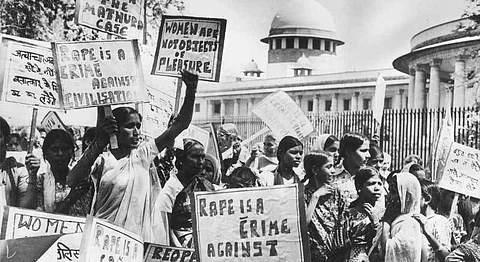
- HOMEGROWN WORLD
- #HGCREATORS
- #HGEXPLORE
- #HGVOICES
- #HGSHOP
- CAREERS
- ABOUT US
- CONTACT US

A lot has happened this year for the women’s movement for equality – from the Women’s March rallies in Washington, USA, the global #Metoo campaign and the #IWillGoOut protests back home. 2017 has been marked by a renewed feminist collective consciousness, and it’s no wonder that Merriam-Webster Dictionary announced their word of the year to be ‘Feminism’. According to the makers, the word is chosen based on the most highly searched term and its growth over the years, and it does truly encapsulate the tone that we’ve set internationally when it comes to gender politics.
Webster’s definition of feminism:
1. the theory of the political, economic, and social equality of the sexes
2. organized activity on behalf of women’s rights and interests
However much progress that has been made by and for women all over the world, the dreaded f-word still remains a highly contentious terrain for a lot of people, especially in India. Recently Manushi Chhillar brought the Miss World crown home to India after 17 years and was lauded across the country. Social media was full of reports and congratulatory posts, among them was an article that posed the question of why beauty pageants are being celebrated anyway in today’s age. While Chhillar’s accolades and accomplishments are great and beyond a doubt, that’s not what is in questions here. Whatever the content of the article may be, the point here was here is a female writer voicing her opinions only to be bombarded and torn down in the comments section. Everything ranging from ‘feminazi’ and ‘hyper-feminist that can never be happy about anything’ was hurled at the publication, with both men and women playing equal parts.
We’re a country of great diversity, disparities, inequalities and prejudices, and we need feminism. We are among the lucky few educated and privileged women that even have a platform to pose such questions when we look at the larger population as a whole. Feminism exists in conversations and on paper – in both a good and bad way – and has become such a bastardised word over time that its vitality and true sentiment has been lost to the point where we have become unable to truly equip women with the resources, facilities and opportunities that gender equality prescribes; this needs to be intersectional, across caste and class boundaries.
Feminism has become an ugly word, one we’ve become so afraid to own. We need to lay down our sharp words and see it for what it really it. Feminism is not about hating men and pulling other women down, nor is it about women being the superior race or negating the problems faced by men under the patriarchal gaze. It includes equality of all genders, of access to opportunities and the freedom of choice. It’s about inclusiveness and open-mindedness, about respecting others and their opinions even while we may agree to disagree, regardless of their gender identity.
If you liked this article, we suggest you read:
